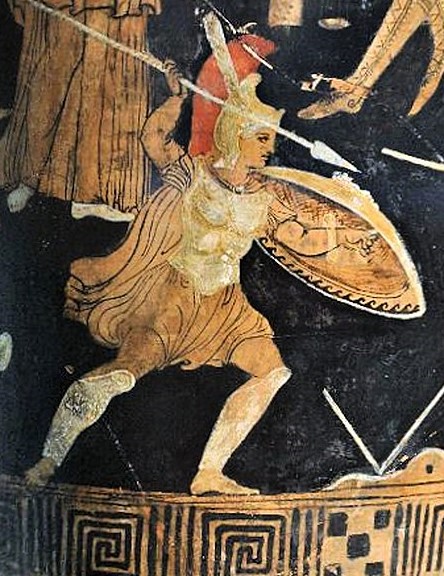
An Iliad, performed by Jason Greenfield at Millésimé, 33 North 2nd Street, Philadelphia, as part of the 2019 Fringe Festival.
This 2012 adaptation of Homer’s story came back to Philadelphia as part of the Fringe Festival. Jason Greenfield directs and performs a solo monologue as a bard or poet who has traveled throughout time to retell the ancient tale.
An Iliad previously was presented by Lantern Theatre in 2016 and will return in a separate production at the Arden Theatre Company in November.
The title of AN Iliad (emphasis on “An”) is apt, as it stresses the fact that there is no one singular version that could be called THE Iliad. Instead, this is one of many different re-tellings.
The epic legend was scripted by Lisa Peterson and Denis O’Hare, based on Homer’s Iliad as translated by Robert Fagles. What distinguishes this version is its juxtaposition of archaic language with modern colloquialism. This is a perfect match for the story-teller’s references to the many battles that followed the Trojan War, up to our own time.
He narrates a tale that presents the allure of wartime heroism and the inevitable costs of battle. As if he were Homer himself, the Poet enters the performance space from outside, stepping in through a sliding glass door. He starts to speak in Greek, then recognizes the audience and switches to folksy, modern, conversational English.
It’s his mission, he tells us, to recount the story to each new generation, until humanity abandons its continual acts of violence. Until that times comes, he is in a story-telling purgatory.
Greenfield is engaging in the way he confides in us and involves us in the adventure. He tells us that he’s come back from the front lines. The Poet spins a tale how a coalition of Greek armies waged war against the city of Troy because Prince Paris, the son of King Priam and Queen Hecuba, stole the affections of Helen, the queen of Sparta.
The goddess Aphrodite made Helen fall in love with Paris and leave her husband, Menelaus. To get vengeance, Menelaus’s elder brother Agamemnon, king of Mycenae, led a coalition of warriors from various Greek city-states. The Trojans had to retreat inside their walls while the Greeks camped on the beaches and waited.
The srongest Greek warrior, Achilles, sulked in his tent because Agamemnon stole his favorite concubine, Briseís, from him. The lifelong closest friend of Achilles, Patroclus, impersonated his friend and went into battle in his place. But Hector killed Patroclus, which shamed Achilles into finally joining the fray.
Achilles’ slew Hector, the leader of the Trojan army, in a battle that’s described in searing detail. This is a tragedy because Hector was a noble prince who had opposed the war.
According to other legends, Paris then fatally wounded Achilles in the heel with an arrow. That dramatic event is not mentioned here because it wasn’t part of Homer’s Iliad. Nor does our story-teller say much about the building of the Trojan Horse and the bloody ending of the war. It’s mentioned briefly, not in detail like the earlier parts of this play. That’s a puzzling choice by the playwrights, but it detracts nothing from the moving performance by Greenfield.
This production repeatedly invokes the long history of human wars, and drawing parallels with America’s practice of sending young men and women into battle to serve their government’s policies.